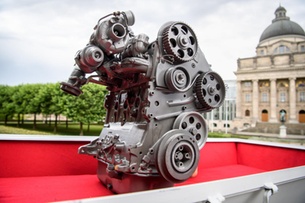Last June in Munich, Greenpeace symbolically showcased a diesel engine in a coffin. (Keystone) After decades of rapid growth, the popularity of diesel vehicles in Switzerland is on the wane following scandals and concerns about environmental impact. The rise of diesel in Switzerland was big and it was fast: accounting for 17.8% of all cars on the road in 2002, last year diesel had more than doubled, to 36.8%, an increase spurred by falling prices since the turn of the century. However, as in other parts of Europe, the growth is starting to stagnate. “Right now, there is a clear tendency against diesel,” says Yves Gerber, spokesman for the automobile association Touring Club Suisse. As some governments (not yet the
Topics:
Swissinfo.ch considers the following as important: Balthasar Glättli, Business, Featured, newsletter, Swiss Markets and News, Touring Club Suisse, Transport and Environment Association, Yves Gerber
This could be interesting, too:
Nachrichten Ticker - www.finanzen.ch writes Die Performance der Kryptowährungen in KW 9: Das hat sich bei Bitcoin, Ether & Co. getan
Nachrichten Ticker - www.finanzen.ch writes Wer verbirgt sich hinter der Ethereum-Technologie?
Martin Hartmann writes Eine Analyse nach den Lehren von Milton Friedman
Marc Chandler writes March 2025 Monthly
After decades of rapid growth, the popularity of diesel vehicles in Switzerland is on the wane following scandals and concerns about environmental impact.
The rise of diesel in Switzerland was big and it was fast: accounting for 17.8% of all cars on the road in 2002, last year diesel had more than doubled, to 36.8%, an increase spurred by falling prices since the turn of the century.
However, as in other parts of Europe, the growth is starting to stagnate. “Right now, there is a clear tendency against diesel,” says Yves Gerber, spokesman for the automobile association Touring Club Suisse.
As some governments (not yet the Swiss) have started to clamp down on high-polluting diesel cars in urban areas, Gerber says that “buying a diesel car risks having something that will be difficult to re-sell on the second-hand market and which could limit access to town centres.”
An analysis by the price tracking site comparis.ch shows that consumers are taking note: in August 2015, 67% of people looking for a used car opted for diesel; by June 2017 this figure had dropped to 52%.
Broader backlash
The drivers of this trend are largely international – notably the emissions scandal of 2015 that led to hundreds of thousands of recalls and a reputational headache for Volkswagen.
More and more cities, particularly in France and Germany, have also restricted the access of diesel-burning cars in urban centres. Cars must display an environmental sticker that shows they are under the legal limit for pollutant emissions, a move that will have an impact on tourists driving through.
France and the UK declared this summer that the sale of diesel cars would be stopped completely by 2040, while the German parliament have asked the EU to develop legislation that would allow for the registration of only emission-free vehicles by 2030 at the latest.
In Switzerland, no major federal decisions have been taken, though the lobby group, Transport and Environment Association, is calling for a blanket ban on all cars that exceed emissions limits. It also calls for anti-smog measures and “green-zone” restrictions similar to those introduced in European cities such as Paris and Athens.
Parliamentarian Balthasar Glättli from the Green Party would like to go a step further. He submitted a motion last spring to ban all diesel and petrol-fuelled cars from 2025.
Tags: Balthasar Glättli,Business,Featured,newsletter,Touring Club Suisse,Transport and Environment Association,Yves Gerber

